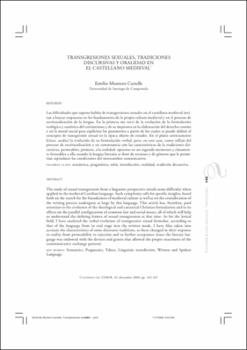Transgresiones sexuales, tradiciones discursivas y oralidad en el castellano medieval
Autor
Montero Cartelle, EmilioFecha
2008Resumen
The study of sexual transgression from a linguistic perspective entails some difficulty when
applied to the medieval Castilian language. Such complexity calls for specific insights, based
both on the search for the foundations of medieval culture as well as on the consideration of
the writing process undergone at large by this language. This article has, therefore, paid
attention to the evolution of the theological and canonical Christian formulation and to its
effects on the parallel configuration of common law and social mores, all of which will help
us understand the defining frames of sexual transgression at that time. As for the lexical
field, I have analyzed the verbal evolution of transgressive sexual formulae, according to
that of the language from its oral stage into the written mode. I have Also taken into
account the characteristics of some discourse traditions, as these changed in their response
to orality from permeability to rejection and to further acceptance (once the literary language was endowed with the devices and genres that allowed the proper enactment of the
communicative exchange pattern). Las dificultades que supone hablar de transgresiones sexuales en el castellano medieval invitan a buscar respuestas en los fundamentos de la propia cultura medieval y en el proceso de escrituralización de la lengua. En la primera me serví de la evolución de la formulación teológica y canónica del cristianismo y de su impronta en la elaboración del derecho común y en la moral social para explicitar los parámetros a partir de los cuales se puede definir el concepto de transgresión sexual en la época objeto de estudio. En el plano estrictamente
léxico, analicé la evolución de su formulación verbal, pero, en este caso, como reflejo del proceso de escrituralización y en consonancia con las características de la tradiciones discursivas, permeables, primero, a la oralidad, opuestas en un segundo momento y claramente favorables a ella cuando la lengua literaria se dotó de recursos y de géneros que le permitían reproducir las condiciones del intercambio comunicativo.





